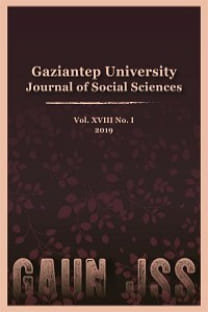Ortaöğretim Matematik Müfredatında Zor Olarak Algılanan Konular ve Bunların Nedenleri
Bu çalışmanın amacı, ortaöğretim matematik müfredatında zor olarak algılanan konuları belirlemek ve bu zorlukların nedenlerini ortaya çıkarmaktır. Bu amaçla ilköğretim matematik, fen bilgisi, okulöncesi ve sınıf öğretmenliği anabilim dalı öğrencilerine bir anket uygulanmıştır (N=353). Anket yardımıyla ortaya çıkan zorlukların nedenlerini anlamak için ise öğretmenlerle görüşme yapılmıştır (N=20). Çalışmanın sonunda konuların zorluğunu belirleyen temel faktörlerden birinin öğrenci seçme sınavı olduğu saptanmıştır ve çeşitli önerilerde bulunulmuştur
Anahtar Kelimeler:
Matematik konularının güçlüğü, güçlük indeksi, ortaöğretim matematiği, öğretmen ve öğrenci
Subjects Perceived as Difficult in Secondary Mathematics Curriculum and Their Reasons
The aim of this study is to determine topics in secondary mathematics curriculum which are perceived as difficult and find the reasons for these difficulties. For this purpose, a questionnaire was administered to students from the departments of elementary mathematics, science education, primary school education and early childhood education (N=353). The teacher interviews were made to understand the reasons for these difficulties (N=20). University entrance exam was determined as one of the fundamental factors of these difficulties and some suggestions wer e given at the end of the study
Keywords:
The difficulty of mathematics topics, difficulty index, secondary school mathematics, teacher and student,
___
- Bahar, M., Johnstone, A. H. & Hansell, M. (1999). Revisiting learning difficulties in biology, Journal of Biological Education, 33 (2), 84–87.
- Baker, J. D. (1996). Students’ difficulties with proof by mathematical induction, The Annual Meeting of American Educational Research Association, New York.
- Kutluca T. & Baki A. (2009a), 10. sınıf matematik dersinde zorlanılan konular hakkında öğrencilerin, öğretmen adaylarının ve öğretmenlerin görüşlerinin incelenmesi. Kastamonu Eğitim Dergisi, 17(2), 609–624.
- Baki A. & Kutluca T. (2009b). Dokuzuncu sınıf matematik öğretim programında zorluk çekilen konuların belirlenmesi. e-Journal of New World Sciences Academy, 4(2), 604-619.
- Bulut, S. (2001). Investigation of performances of prospective mathematics teachers on probability. Hacettepe Üniversitesi Eğitim Fakültesi Dergisi, 20: 33- 39.
- Camacho, M., Depool, R, & Santos-Trigo, M. (2009). Students’ use of derive software in comprehending and making sense of definite integral and area concepts. CBMS Issues in Mathematics Education, 16, 35-67.
- Durmuş, S. (2004), Matematikte öğrenme güçlüklerinin saptanması üzerine bir çalışma, Kastamonu Eğitim Dergisi, 12(1), 125-128.
- Gürbüz, R. (2010). The effect of activity based instruction on conceptual development of seventh grade students in probability. International Journal of Mathematical Education in Science and Technology, 41(6), 743-767.
- Mahmoud, N. A. & A. H. Johnstone(1980). Isolating topics of high perceived difficulty in school biology, Journal of Biology Education, 14 (2), 163– 166.
- Rasmussen, C. L. (1998). Reform in differential equations: A case study of students’ understandings and difficulties. The Annual Meeting of American Educational Research Association. San Diego, CA, 13–17 April.
- Tall, D. (1993). “Students’ difficulties in calculus”, proceedings of working group 3 on students’ difficulties in calculus. ICME-7, 13-28, Quêbec, Canada.
- Tall, D.O. & Razali, M.R. (1993). Diagnosing Students’ Difficulties In Learning Mathematics. Int. Jnl of Math. Edn in Sc. & Tech., Vol 24, No. 2, 209- 222.
- Tatar E. & Dikici R, (2008), Matematik eğitiminde öğrenme güçlükleri. Mustafa Kemal Üniversitesi Sosyal Bilimler Enstitüsü Dergisi, 5(3), 183-193
- Tatar, E., Okur, M. & Tuna, A. (2008). Ortaöğretim matematiğinde öğrenme güçlüklerinin saptanmasına yönelik bir çalışma. Kastamonu Eğitim Dergisi, 16(2), 507-516.
- Tuna, A. & Kaçar, A. (2005). İlköğretim matematik öğretmenliği programına başlayan öğrencilerin lise 2 matematik konularındaki hazır bulunuşluk düzeyleri, Kastamonu Eğitim Dergisi, 13 (1), 117-128.
- Zachariades, T., Christou, C. & Papageorgiou, E. (2002). The difficulties and reasoning of undergraduate mathematics students in the identification of functions. Proceedings in the 10th ICME Conference, Crete, Greece
- ISSN: 1303-0094
- Yayın Aralığı: Yılda 4 Sayı
- Başlangıç: 1991
- Yayıncı: Gaziantep Üniv. Sosyal Bilimler Enst.
Sayıdaki Diğer Makaleler
Esad ESGİN, Harun Aksaya, Oğuzhan KIRÇALI, Ahmet DİREK, Mahmut KILIÇ
Öğretmen Yetiştirmede Klinik Uygulama
Yapı-Eylem Düalizminden Toplumsal Alanlar Teorisine
Öğretmen Adaylarının Grafikler Konusundaki Bilgi Düzeyleri
URSAVAŞ. Faruk Ömer, David MCILROY, ŞAHİN. Sami
Yeni Sosyal Hareketler İçinde Sınıfın Yeri
Okullarda Etkili Stratejik Plan Hazırlama Süreci: Bir Eylem Araştırması
Ömer Faruk URSAVAŞ, David MCILROY, Sami ŞAHİN
